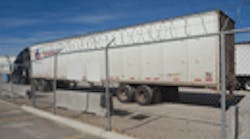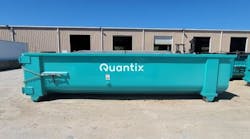A new weapon will be deployed against cargo theft starting today: a national system intended to provide more efficient, accurate, and timely sharing of cargo-theft information between freight carriers, shippers, their insurers and law enforcement.
CargoNet is a new database and secure information-sharing network constructed by ISO Crime Analytics Inc. along with the National Insurance Crime Bureau (NICB) to coordinate data-sharing and provide training and investigative support for law enforcement as well as with theft-prevention services and analytics.
“Information sharing is the key in the battle against cargo thieves,” Maurizio Scrofani, managing director of CargoNet, told FleetOwner. “It not only allows law enforcement to react faster when thefts occur, it helps develop intelligence as to where thefts are occurring, what goods are being stolen, plus what modes and/or freight lanes are being targeted. Information also helps transport providers identify where they should deploy the greatest security – to be proactive instead of reactive to cargo theft trends.”
In development since late 2009, CargoNet officially goes live at 1 pm EST today. The system is set up so member companies – transport providers, insurers, shippers, etc. – can quickly provide details to law enforcement about cargo thefts.
However, stressed Scrofani, only law enforcement gets access to these details – the system intentionally “masks” the details insurers and others can access, so transportation companies in particular don’t risk higher premiums simply by reporting cargo thefts.
Over time, Scrofani said CargoNet will develop more detailed analysis of the cargo- theft data received so it can map out trends and provide insight back to members.
“We have a handful of analysts in our ‘control room,’ if you will, breaking this data down,” he explained. “As we move forward, we hope to use the cargo theft information we receive to help our members better mitigate risk. For example, if we see more thefts occurring on a lane between point A and B, we could recommend shipments travel from point A to point C and then to point B to avoid that area. Information about what’s being stolen – say, high definition TVs – can give members the opportunity to increase security on those shipments as they will know they are being targeted.”
The Federal Bureau of Investigation (FBI) estimates that cargo theft is a $15 billion to $30 billion a year problem in the U.S., though the agency said the true measure may be even higher, since some businesses are reluctant to report thefts out of concern for their reputations or insurance premiums.
That reluctance is what CargoNet’s data “cloaking” among members seeks to address, said Scrofani.
Hugh Burgess, global marine head-the Americas for Allianz Global Corporate & Specialty Marine Insurance Co., which is a member of CargoNet, said other developments are in the works that go well beyond the database portion of the information-sharing network:
- Creating adhesive decals and magnetic labels for cargo containers to show thieves that the assets of companies participating in CargoNet represent a higher risk to them.
- Building up a neighborhood TruckStopWatch program to focus on truckstops and train employees to spot suspicious activity and to create incentives for employees and drivers to take action.
- Offering driver education and incentives with specialized training, alerts and a tips hotline to keep drivers prepared to avoid theft.
- Elevating theft alerts, with tracking systems scanning the Internet for attempts by thieves to sell stolen cargo.
- Creation of an online meeting place for law enforcement, insurers and truck owners to host a virtual community of stakeholders to serve as a conduit for theft alerts and online learning.
“Cargo theft causes significant direct and indirect losses throughout the supply chain, and left unchecked, it results in an economic drain to shippers, carriers and, ultimately, consumers,” said Pat Stoik, vp & global commercial inland marine manager for the Chubb Group of Insurance Companies, which is also a CargoNet member. “A national database will make it easier to spot cargo theft trends and develop effective loss prevention techniques.”
“This effort will be a major step forward in the fight against cargo theft,” Mary Aftanas, NCIB’s director of property/casualty investigators, told FleetOwner. “In the past, information sharing remained ad hoc and fragmented at best. But the sooner more uniform information about a cargo theft is reported, the greater likelihood there is of recovery. That saves money for the carrier, the insurer and the American public alike.”
CargoNet’s Scrofani noted that there is a yearly fee to be a member of this new information-sharing system; for transportation companies, that fee is mainly calculated based on their gross yearly revenues. “For owner-operators and smaller carriers, we tier that fee based on the number of trucks they own,” he said.




